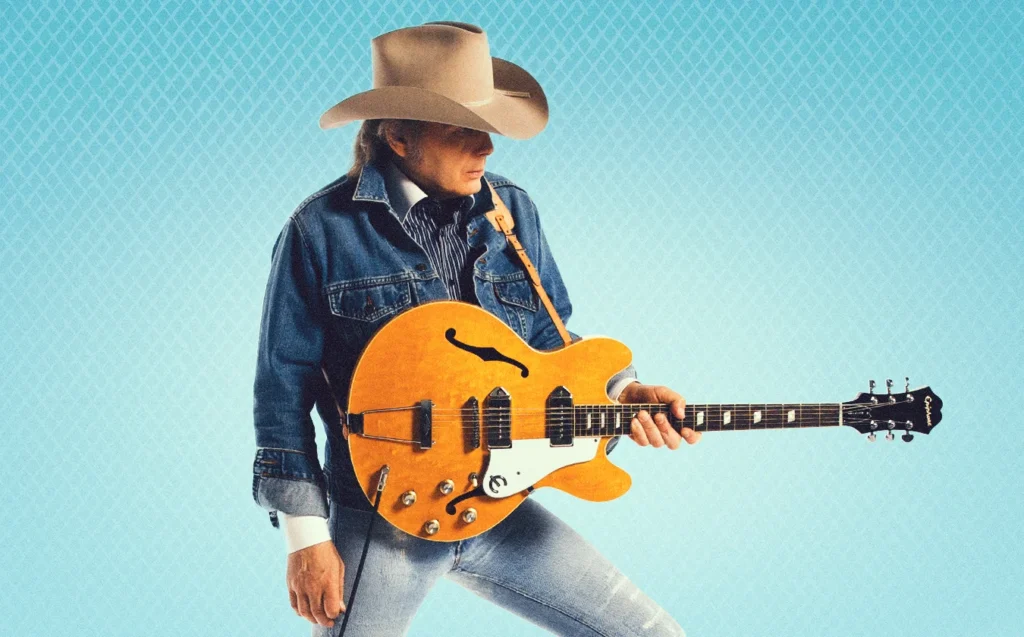
A power-pop plea reborn as a honky-tonk confession—a twangy, late-night vow where swagger gives way to sincerity and the chorus feels like reaching across a kitchen table.
Before we get lost in memory, the essentials: “I Want You to Want Me” is Dwight Yoakam’s Bakersfield-tinged cover of the Rick Nielsen classic made famous by Cheap Trick. Yoakam cut it for his 11th studio album, Tomorrow’s Sounds Today (Reprise), released October 31, 2000 and produced by his longtime collaborator Pete Anderson. Issued as a single in 2001, Yoakam’s version reached No. 49 on Billboard’s Hot Country Songs—a modest peak that belies its staying power on stage and in fans’ memories. For context, Cheap Trick’s live Budokan take hit No. 7 on the Billboard Hot 100 in 1979, which is the shadow every cover must step out of—and Yoakam does, by changing the frame rather than chasing the original’s sheen.
What makes Yoakam’s cut feel so right is the way he translates a power-pop hook into Bakersfield muscle and grace. The arrangement is lean and air-tight: baritone-bright Telecaster figures from Anderson, pedal steel sighs (Gary Morse), Scott Joss’s fiddle tracing the melody, and that steady back-beat that invites a slow two-step instead of a pogo. No gloss, no studio fireworks—just a band playing in one mind, leaving space for the vocal to carry the message. This is the same aesthetic that anchored Tomorrow’s Sounds Today front-to-back, and you can hear it in the credits: Anderson producing and picking, core road-band players locking in, the tone warm, present, and unhurried.
Yoakam also knew what he was doing culturally. A year earlier he’d reminded radio that a ’70s rock anthem could bloom in country soil when his version of “Crazy Little Thing Called Love” climbed to No. 12 Country (and even grazed the Hot 100). Covering “I Want You to Want Me” wasn’t a novelty move—it was a continuation of that conversation between roadhouse and rock club, proof that a great song is elastic if you respect its bones. Where Cheap Trick’s hit rides fizzy adrenaline, Yoakam leans into plain-spoken yearning, trading pop brightening for a honky-tonk ache that older ears recognize instantly.
Lyrically, the song has always been disarmingly simple: need, named out loud. Yoakam treats that simplicity like a virtue. He shortens the distance between singer and listener, sanding away irony until the plea feels like something you’ve said yourself after a long drive home: I want you to want me; I need you to need me. In his hands, the chorus stops sounding like a stadium chant and starts sounding like a promise you make in a quiet room—one you intend to keep. The twang isn’t for show; it’s the emotional color of responsibility, of a person admitting desire without hiding it behind a wink.
Musically, listen for the little choices that sell the story. The steel guitar doesn’t cry; it answers, echoing the vocal as if the band is nodding along with the confession. The groove stays pocketed—no drama, no rush—so the lyric can breathe. And Yoakam’s phrasing sits just behind the beat, that trademark laid-back drawl turning a pop hook into a country slow-burn. It’s the sound of restraint, and restraint is what makes the payoff feel earned when the chorus finally opens up.
For many of us who lived with this record, Tomorrow’s Sounds Today felt like the moment Yoakam doubled down on country classicism without losing his edge. The production is modern enough to sit on turn-of-the-millennium radio, but the heart of it—the timbre, the timing, the trust in melody—is pure lineage: Buck Owens and the Telecaster snap; Merle’s plain truth telling; dance-floor songs that move bodies because they move feelings first. That’s why this cut still sneaks into set lists and onto playlists: it reclaims a familiar chorus for a different room and a different kind of listener.
And if you’re of a certain age, you may remember hearing this one on an evening drive—AM glow fading, the local DJ’s patter giving way to that unmistakable voice. You didn’t need liner notes to get it. Dwight Yoakam wasn’t trying to out-sing Cheap Trick; he was translating the request. The message stayed the same, but the accent changed, and in that new accent the song became something the dance floor could hold onto: unvarnished longing with a steady beat beneath it, the kind that keeps couples turning until the neon lights buzz out and the bartender flips the chairs.
Key facts, up front: Song: “I Want You to Want Me.” Artist: Dwight Yoakam. Album: Tomorrow’s Sounds Today (Reprise; released Oct 31, 2000; producer: Pete Anderson). Writer: Rick Nielsen. Single peak: No. 49, Billboard Hot Country Songs (2001). (For comparison, Cheap Trick’s live 1979 single hit No. 7 on the Hot 100.)